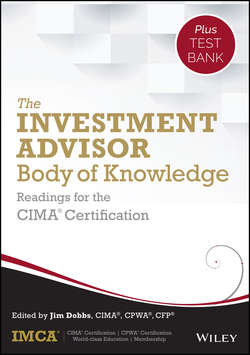Читать книгу The Investment Advisor Body of Knowledge + Test Bank - IMCA - Страница 22
На сайте Литреса книга снята с продажи.
CHAPTER 2
Regulatory Considerations
SEC
ОглавлениеThe mission of the U.S. Securities and Exchange Commission is to protect investors, maintain fair, orderly, and efficient markets, and facilitate capital formation. Though it is the primary overseer and regulator of the U.S. securities markets, the SEC works closely with many other institutions, including Congress, other federal departments and agencies, the self-regulatory organizations (e.g., the stock exchanges), state securities regulators, and various private sector organizations.
The Securities Exchange Act of 1934 created the SEC to interpret securities law, to provide rules regarding the disclosure of information by public companies, and to enforce those rules. Market participants, including securities exchanges, brokers and dealers, self-regulatory organizations, clearing agencies, and others are required to register with the SEC. These entities are required to disclose information regarding their financial condition and business practices, including the registration of new securities, annual shareholder reports, and mergers and acquisitions. The SEC requires also that investments such as mutual funds, exchanged-traded funds, and others disclose information useful to investors so that they can make informed investment decisions.
To determine standards for what information should be disclosed by these various organizations and public companies and how that information should be presented, the SEC works closely with self-regulatory organizations such as the Financial Accounting Standards Board. The SEC also oversees securities exchanges, self-regulatory organizations, and credit rating agencies.
In a single statement, the SEC exists to provide investors with rules for the fair execution of trades and to enforce those rules. To that end, several major violations of fair trading are prohibited by the SEC. The SEC prohibits the use of insider or nonpublic information to place trades. For example, wash sales can be used either to create artificial tax losses or, when used by very large shareholders, to mislead investors by manipulating the share price. Wash sales occur when investors sell shares only to almost immediately buy back those same or similar shares, usually within 30 days. Churning, whereby an advisor creates multiple transactions, typically over a short period of time, that generates commissions or other income and increases the costs to a client's invested assets without a clear benefit to the client, is also prohibited.
In order to provide investment professionals with the information they need to follow these rules and maintain the integrity of the securities industry, the SEC administers the examination and inspection programs for all registered self-regulatory agencies, investment companies, broker–dealers, and advisors, among others in the securities business.
The SEC also has jurisdiction over the private, nonprofit Securities Investor Protection Corporation (SIPC) that insures customer accounts at member brokerage firms against the failure of those same firms. Unlike Federal Deposit Insurance Corporation (FDIC) coverage, SIPC insurance does not insure accounts against loss due to market movements.
